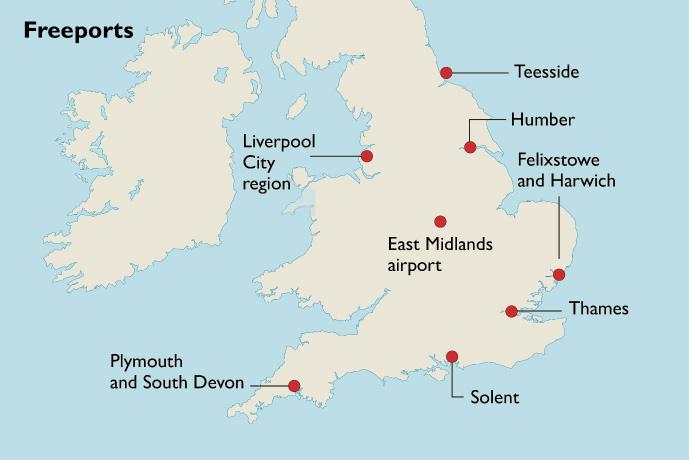
4 minute read
Freeports update
UK FREEPORTS – AN UPDATE
One of the identifi ed benefi ts fl owing from Brexit is the ability for the UK to establish Freeports. So far there has been a lot of talk, but what is actually happening? Andrew Penfold examines the state of play
The announcement in the Spring Budget that the UK will establish a series of Freeports is a signifi cant part of postBrexit policy. The seaports announced include zones around (and including) Felixstowe/Harwich, the Humber ports, Liverpool, Plymouth, Southampton, and Teesside – with East Midlands airport also benefi ting from the policy.
The situation in Scotland remains unclear, with a row developing between the UK and devolved Scottish governments.
What is certain, however, is that this policy is firmly in place and will accelerate in the medium term.
POSITIVES AND NEGATIVES
Freeports as a concept remain controversial and it is worth briefly looking at their impact. The primary motive is the boosting of economic development in – often – backward areas. In the UK benefits include: 5 Lower tax rates on buildings and renovations 5 Capital tax allowances of 100 per cent 5 Full stamp duty (transaction) tax relief 5 Business tax relief for existing and new businesses locating in the zone.
These are all designed to stimulate economic activity and this – at least in theory – should pass through into increased trade volumes at a designated port. against competition from – mainly – EU operators. The Freeport idea will clearly lift FDI in the UK, which is a highly important post-Brexit argument.
Recent issues in global supply chains also point to the advantages of Freeports. The move away from Just-in-Time strategies to a more prudent inventory policy will clearly favour Freeports and improve security of supply considerations.
TROUBLE AHEAD?
Overall, a positive impact on the UK economy seems certain to flow from the policy and it fits very well with the UK government’s aims to boost economic prospects in the more ‘left behind’ parts of the UK. The benefits have already been seen in the high valuations offered for the sale of PD Teesport – which will clearly be a direct beneficiary of the new policy.
The EU has been opposed to Freeports. Although the EU has numerous ‘free zones’ their State Aid law is designed to limit ‘beggar-thy-neighbour’ policy frameworks. Outside the EU, the UK will not be subject to this and could use Freeports to attract business from the EU and to play a role as a distribution hub for EU markets. This is bound to run into opposition and lead to contract bidding opportunities being closed off (although this may well be the least of the EU’s problems in coming years). This aspect will need close examination for Freeport investors.
PORT IMPLICATIONS
From the current perspective the Freeport policy seems certain to benefit the major ports, with increased investment in the identified zones and, ultimately, higher volumes. They may well also serve to improve the currently chronically imbalanced nature of UK container port flows. While clearly not a panacea, only limited – if any – downsides are noted for the ports, although the jury is still out regarding the broader economic impact on the UK as a whole. What is clear, however, is that all significant ports want to be in the game including some such as Bristol which were not nominated by the UK government.
Freeports as a concept remain controversial . . . there are pros and cons ‘‘
On the other hand, critics have underlined some adverse issues. The main risk is that the zones will not act as a catalyst in overall economic growth but rather redirect existing businesses to these locations, with the government seeing a resulting net revenue reduction as more operators seek to benefit from lower taxes. Also, it is not clear that the desired highly skilled jobs will result.
Most of these issues seem like ‘special pleading’ from existing interest groups and economic theory – and experience – tend to confirm net overall benefits. This is the UK government’s belief. The ‘zero sum’ arguments are clearly out of favour.
WHAT IS THE LIKELY POSITION?
It seems certain that the effective reduction in production costs that will flow from operating in a Free Zone will be significant. The combined impact has been estimated at an overall cost reduction of around 5-7 per cent. This can only increase the competitive position of UK manufacturing – and product processing. On the other hand, an investor looking to develop a new plant may well seek to locate in a Zone rather than elsewhere in the UK. This downside should be outweighed by an improved overall UK competitive position versus other locations.
The impact on the UK economy is seen as positive not just as an improvement versus other UK locations but also
8 The nominated










